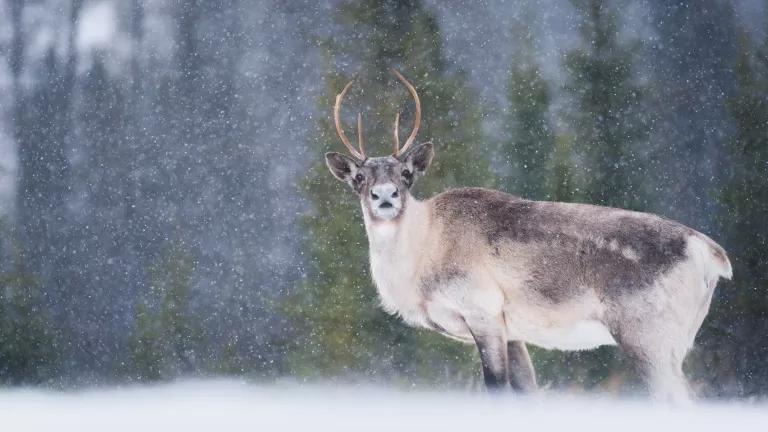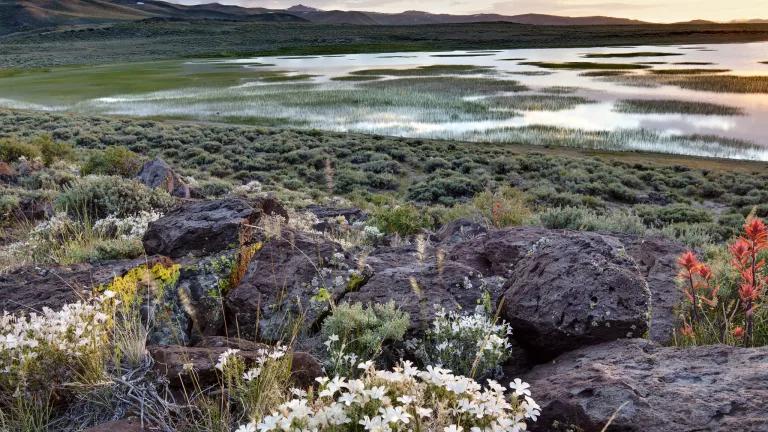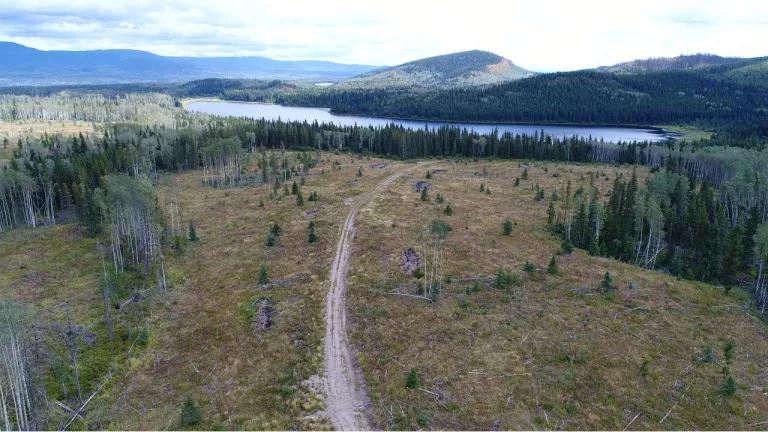
The approval of two new roads in Northern Quebec brings the logging industry further into one of the province’s few remaining intact forests located within the commercial harvest zone.
The proposal—supported by five companies—had evolved from around 65 miles of new roads to 45 miles, with 20 miles finally approved by Quebec, allowing industry clearcutting to strike toward the heart of the 5 million acre Broadback River Valley forest. That forest, which is located within the watershed of the Broadback River, is a small part of the ancestral home of the Waswanipi Cree who continue to use the land year-round to hunt and fish and be on the land that they have used and stewarded for centuries. At the same time, the area is one of the final refuges for several endangered herds of woodland caribou—a species under threat of extirpation across much of Canada due to habitat loss from human activity.
Despite concerns raised by environmental organizations like NRDC and general opposition from the Waswanipi community and warnings about negative impacts from caribou scientists, the government of Quebec has granted its seal of approval to portions of these two roads. In a statement following the decision, the Waswanipi Chief, Marcel Happyjack, stated that the community was “satisfied that the approval of these roads in the Broadback Forest will not encroach on [the Waswanipi] proposed protected area.” At the same time, he stressed that there is a need for environmental reviews in the region to begin considering cumulative impacts, not to mention the harmful impacts these projects are having on the woodland caribou, which depend on the region for their survival. While Quebec’s decision grants a reprieve for portion of the Broadback River valley within the proposed Waswanipi protected area, the approval of these logging roads amplify the imminent nature of the threat Quebec’s remaining intact forests face from industry’s push north and highlight the need for rapid action to preserve what remains from irresponsible, unsustainable clearcutting.
Tyler Rudolph, a prominent Canadian caribou scientist, so succinctly summarized the threat in comments provided to the Quebec government
[I]t is my assessment that approval of proposed forest access road H and I would jeopardize the prospect of caribou population recovery in the James Bay region. A number of compelling facts support this notion, not the least of which include the presently insufficient critical habitat supplies and the continued inexistence of an acceptable science-based recovery plan. In addition, the particular role of the Broadback forest as the central hub of a dispersal corridor facilitating genetic exchange between regional populations makes its protection vital to long-term woodland caribou persistence on the landscape. Indeed, evidence suggests that the anthropogenic footprint resulting from forestry activities associated with the access roads in question would render the area affected by logging inhospitable to caribou indefinitely.
The brown line beginning in the bottom left is the position of the existing logging road that will be approved under Quebec’s decision. The green and red double lines indicate the position of the new roads that were approved. The thick pink lines indicate the extent of the proposed roads that were not approved.
Map courtesy of COMEX.
In the decision, which was issued on April 28, 2016 and made public on May 4, 2016, Quebec limited the extent of the two new roads—known as “H West” and “I”—to 32 kilometers (20 miles), approximately 43% of the original proposal.[1] In doing so, it chose to leave a currently 100% intact Waswanipi trapline untouched, while shortening the second road to provide access only to areas already approved for logging in Quebec’s 2013-2018 forestry plan. Based on a map of these approved logging areas, it appears that a substantial portion of the 300,000 acres that industry had said these roads would give them immediate access to will remain inaccessible for the time being (see map below). Meanwhile, the government made a point to highlight that its approval of these roads will not encroach on the proposed protected area the Waswanipi Cree have been asking the Quebec government to preserve for the last decade.

The circled area indicates the northern extent of logging blocks approved by Quebec through 2018 accessible Road H. The government’s approval of these roads used these existing cutting blocks to decide to shorten this road proposal from 22 km to 9 km.
Map courtesy of COMEX.
[[{"fid":"9111","view_mode":"full_content","fields":{"format":"full_content","field_file_image_alt_text[und][0][value]":"","field_file_image_title_text[und][0][value]":"","field_image_caption[und][0][value]":"","field_image_attribution[und][0][value]":""},"type":"media","link_text":null,"attributes":{"height":448,"width":634,"class":"media-element file-full-content"}}]]
Map showing the extent that the Fall 2015 industry proposal would have penetrated into the Waswanipi’s protected area proposal. The current approval leaves the two new roads ending south of the area’s border.
Map courtesy of COMEX.
Though the portion of the Broadback River valley that the Waswanipi Cree are focused on preserving appears to have avoided the loggers’ saws today, Quebec’s decision to approve these roads highlights the growing pressure intact forests and the species who depend on them across Quebec are facing. Caribou populations across the province are dwindling, the government has begun to eye opening once-off-limit areas up for future logging, and industry is complaining that it can’t adapt to the rising need to embrace conservation over aggressive over-cutting of the boreal forest. As Canada’s largest forest harvester by area, Quebec bears an enormous responsibility to steward its forests sustainably—for the sake of the ecosystems they support, not to mention the global climate they help to stabilize. Allowing the logging industry to continue its press northward into pristine wilderness, leaving a checkerboard of clearcuts in its wake is the opposite of sustainability. Meanwhile, the province’s continued failure to implement long-promised caribou management plans—while approving huge areas for annual harvesting—continues to call into question how seriously it takes the environmental harms meted out on a daily basis by its timber industry.
[1] The approval also allows for improvement of 21 kilometers of existing road that connects these brand new forestry roads to a highway.




